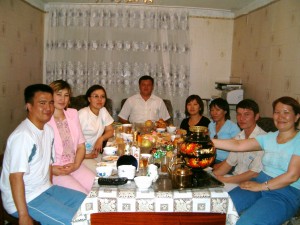Here’s another of my many Deleted Scenes (they are growing weekly, as I continue to fine tune my manuscript). This one features two of my colleagues, Gulzhahan and Gulzhan. Their names are so similar, my readers often get confused.
Gulzhahan’s name has three syllables and is of Persian origin; she was my counterpart. Gulzhan’s name has two syllables; she was the great cook. If you can make a cognate out of that, go for it.
I arrived back in Zhezkazgan shortly before Gulzhahan’s birthday. I wanted to choose an appropriate gift, a tangible sign of my gratitude. I bought her an electric samovar.
With chai (tea) such an important part of every feast, and because it was something she’d not buy for herself, I thought it the perfect gift.
I set out to find the right one and I asked my colleague Gulzhan to help me.
“From Russia; not China. That’s good,” Gulzhan said often as we examined different samovars at numerous stores. Finally, she settled on one with an ornate orange floral design painted on a black background. Not what I would have chosen, but I trusted Gulzhan. She knew Gulzhahan well, and certainly longer than the eighteen months I’d known her.
If “appropriate decorative embellishment” was on a continuum with the Danes at one end (with their spare, simple lines), I’d put the Kazakhs on the other end. It was one of those cultural differences I never got used to.
I took the samovar to Gulzhahan’s apartment the afternoon before her party, carried it up the stairs by myself, and watched her open it. The glee spread slowly across her face as she recognized what it was.
When she briefly complained, “It is too much,” I reminded her of all she’d done for me. “Will you take my picture?” she asked and, when I had taken out my camera, she bent low next to her new orange and black electric samovar while I captured her broad smile.
After spending the last hour and a half looking through my digital photos,
I cannot find the photo I took of Gulzhahan with her samovar.
I shall keep looking.
But here’s one with the whole party later on.
You can see the new samovar on the table.

Gift giving is so often about reciprocity. I wanted to give a gift equal in some way to all that Gulzhahan had given to me. From her ideas for seminars I could run, her negotiating skills to get me classes I’d enjoy teaching, and matching me with great teachers to teach with — all things she could do as the local, the native — she had made my time there worthwhile. How could I, the alien, possibly reciprocate?
For me, it was still about balance, equanimity, equality.
###
I raised the issue of gift giving with my colleagues during my first year. I remember the long silence as they prepared their answer.
Finally, Assem offered, “If you open the gift immediately,” she began, “it says you never got a gift before, or maybe you are greedy.” The others nodded in agreement.
No it wouldn’t, I wanted to protest. But I stayed silent. It was an angle I’d never considered, another cultural difference.
“Also, here,” Gulzhan added after more thought, “Money is important. Sometimes it is collected from the guests beforehand. This is their present. It helps with the cost of the party.” I hadn’t thought of this either. How practical in this country of such poverty, I now thought. A way to afford to celebrate each other’s happy events.
It’s not that Kazakhs never give gifts, they do. But they don’t give them ahead of time, like at showers as we do; they don’t have showers, actually, believing it might jinx the happy event to give a gift in anticipation.
And they don’t generally give store-bought gifts. Whether that’s a holdover from the Soviet years when there was simply not a lot of choice on store shelves, or a more recent holdover from the years of such sudden and incomprehensible poverty, I simply didn’t know.
They give pre-owned gifts that have been appreciated or complimented by others at some point.
I remembered this a few months later when my student Gulsana, following a short-lived English Club I held that first semester, complimented me on my leather rucksack.
“I love your bag,” she said. “May I see it?”
I decided to have some fun with her.
“Thank you,” I said first, offering her my bag to look at more closely. “But you can’t have it.”
When she laughed right back, I continued the joke. “Did I tell you, I really like your boyfriend?”
At this, she and the others in the group howled in laughter.
There was always so much laughter. As I look back, I realize that’s really the best gift of all.
How about you? What guides you when you choose a gift to give?
Leave a Reply